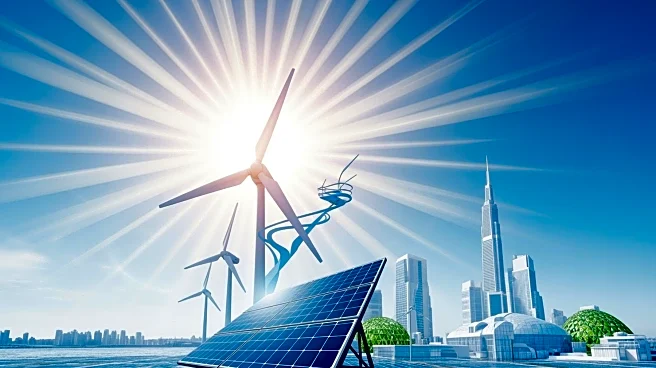What's Happening?
Renewable energy production has officially surpassed coal for the first time, marking a significant shift in global power generation. According to a report from the energy think tank Ember and the International Energy Agency (IEA), renewables, primarily
wind and solar, generated 5,072 terawatt-hours of global electricity in the first half of 2025, surpassing coal's 4,896 TWh. This transition is largely driven by clean energy expansion in China and India, where falling coal generation and record renewable additions have reshaped the power mix. Pablo Dias, a climate-tech CTO and sustainability researcher, has released a new book titled 'Climate Changed,' which emphasizes the importance of this milestone and the need for continued progress towards Net Zero by 2050.
Why It's Important?
The surpassing of coal by renewable energy is a pivotal moment in the global energy transition, demonstrating that renewable sources can meet rising demand while significantly reducing emissions and pollution. This shift has profound practical, economic, and environmental implications, including cleaner air, fewer health impacts, and increased competitiveness of renewables in terms of cost and reliability. The transition is also spurring innovation in energy storage, grid flexibility, and system resilience, which are crucial for maintaining stable and affordable clean power. Dias highlights the role of individuals and communities in accelerating this progress, arguing that systemic transformation and individual participation are essential to achieving sustainability goals.
What's Next?
As the world celebrates this milestone, the focus will be on sustaining the momentum and accelerating the pace of renewable energy adoption. Dias's book 'Climate Changed' serves as a guide for individuals to influence local policy, support renewable initiatives, and reshape narratives around sustainability. The book aims to empower readers to move from awareness to action, emphasizing the collective power to shape the future. The continued expansion of renewables will require ongoing innovation and collaboration among governments, businesses, and civil society to ensure a stable and sustainable energy transition.
Beyond the Headlines
The transition from coal to renewables represents more than just an environmental victory; it challenges the narrative of 'doomism' that often undermines progress in addressing climate change. Dias's work explores the psychology of engagement and the cultural forces that can hinder sustainability efforts. By bridging science and story, 'Climate Changed' provides clarity and optimism, encouraging individuals to recognize their role in driving meaningful change. This milestone in renewable energy is a reminder that despite challenges, progress is possible, and every person has a role in ensuring it continues.















